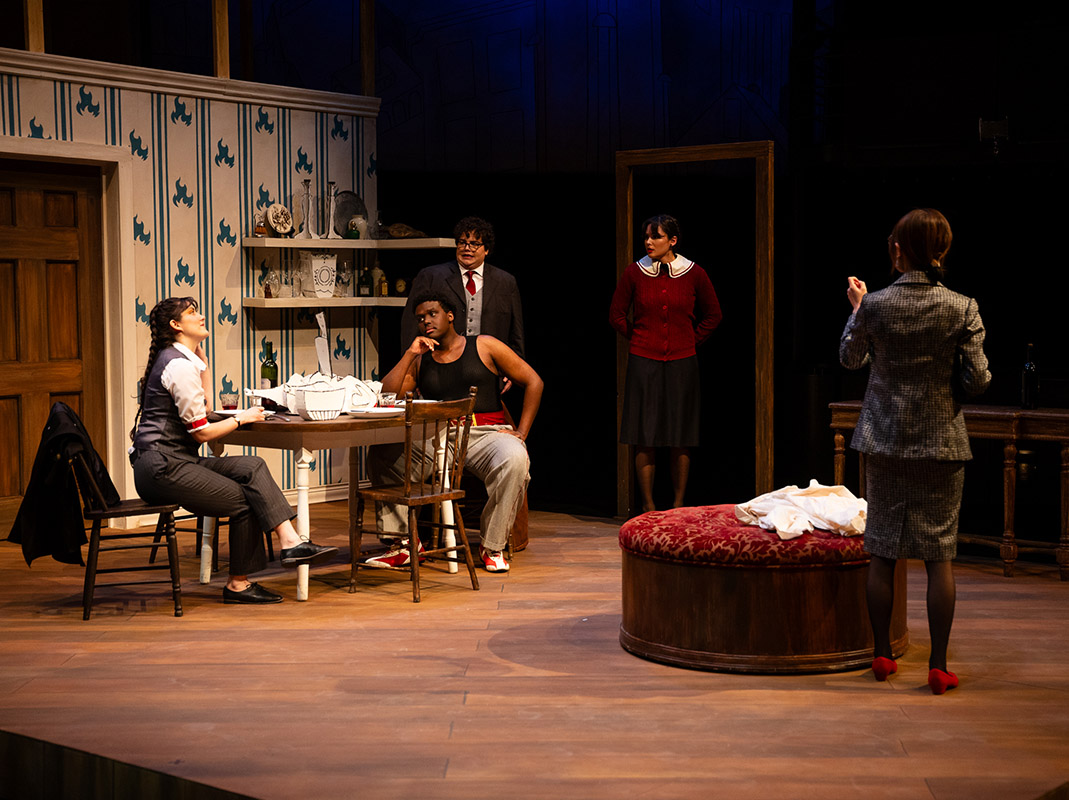A stirring reminder of the cost of complacency in an era of turmoil, The Arsonists mixes the grandeur of an ancient Greek tragedy with an allegory of the fall of the Weimar Republic in 1930s Germany to Fascism, enhanced by sharp acting and punchy sound design.
The UBC theatre production of the play written by Max Frisch was directed by Stephen Heatley. It ran from January 29 to February 8 at Telus Studio Theatre at The Chan Centre for the Performing Arts on campus. The story follows businessman Gottlieb Biedermann, a model of civic virtue, and his household as a stand-in for early 20th century Germany, and their dealings with Josef Schmitz and Billy Eisenring who play the titular arsonists of the play, representing the forces of political extremism.
At first, Biedermann offers his attic to the arsonists out of sympathy for their stories of hardship, but this goodwill is abused by Schmitz and Eisenring after the placement of several barrels of oil in the attic, which eventually leads to their whole city being burnt down.
Despite Biedermann knowing about the oil drums early in the action, he refuses to take any action, instead holding fast to the belief that as long as he appeases the arsonists, he can save his house and quiet life from the fires of chaos.
The rest of the household are complicit as Anna the maid and Biedermann’s wife Babette become enchanted by the arsonists’ stories of poverty and victimhood.
But while the portrayal of these characters on paper may seem flat or unsympathetic, the stand-out acting from the main cast – in particular Miles Davies as Biedermann and Paula Goldie as Anna – brought out a humanity that highlights the tragedy.
In particular, near the end of the play, as Biedermann despairs at the realization of who he’s been really hosting in his attic, he addresses the audience, asking them what would they have done in his shoes? It’s a reminder that complacency is not just a historical artifact, but something which no one is safe from.
The arsonists, too, are more than what they seem on the surface to both the Biedermann household and the audience at first glance.
When Schmitz and Eisenring first appear, the audience is led to believe they are nothing more than chaos and destruction personified. When a Doctor of Philosophy appears, who is focused on the ideological and theoretical side of the fire, we are reminded that however much we want to dismiss political extremists as raving lunatics, the coalition for extremism – whether in 1930s Germany or today across the democratic world – is broader than we sometimes acknowledge. Such a group can recruit from across society, from blue collar workers to intellectuals.
As the play progresses, a chorus of firefighters, in the style of ancient Greek drama, stand at the edge of the scene offering commentary about Biedermann and the city. In one particularly memorable scene, they forcefully confront the businessman after his failure to report the arsonists to the police for storing oil drums in his attic. The chorus’ awareness of the oncoming attack and preparation for it fail to prevent them from being ensnared by the arsonists in a trap that seals the fate of the Biedermann household and of the city.
The chorus is most clearly representative of the democratic guardrails and institutions that we depend on to safeguard ourselves from the rise of extremist and authoritarian politics. Yet their fate in the play tells us that they cannot by themselves shield us when we fail to take action.
Alongside the tight script, the sound design of the play played a large part in creating an environment of tension and a crawling sense of despair. The ominous chimes of a clock occasionally ringing out across the theatre remind us of the ever-closer approach of a disastrous midnight. The use of blaring air raid sirens during a speech by the Doctor of Philosophy made that scene almost biblically apocalyptical, further reinforcing the play’s overall tragic atmosphere.
While the play is based on events from the 20th century, the core message of the play – which is the dire costs of failing to stand up to tyrants and demagogues in favor of appeasement – resonates all too clearly today.
Layered on top of the script, a sympathetic performance from the Biedermann household and a chillingly sinister one from the arsonists makes the play well worth the lingering reflection it induces.
DANIEL LI IS A GRADE 11 STUDENT PASSIONATE ABOUT POLITICS AND JOURNALISM.
(NOTE: UBC Theatre and Film’s final production of the 2024/2025 season, The Last of the Pelican Daughters, is onstage at the Frederic Wood Theatre from March 19–29.)
